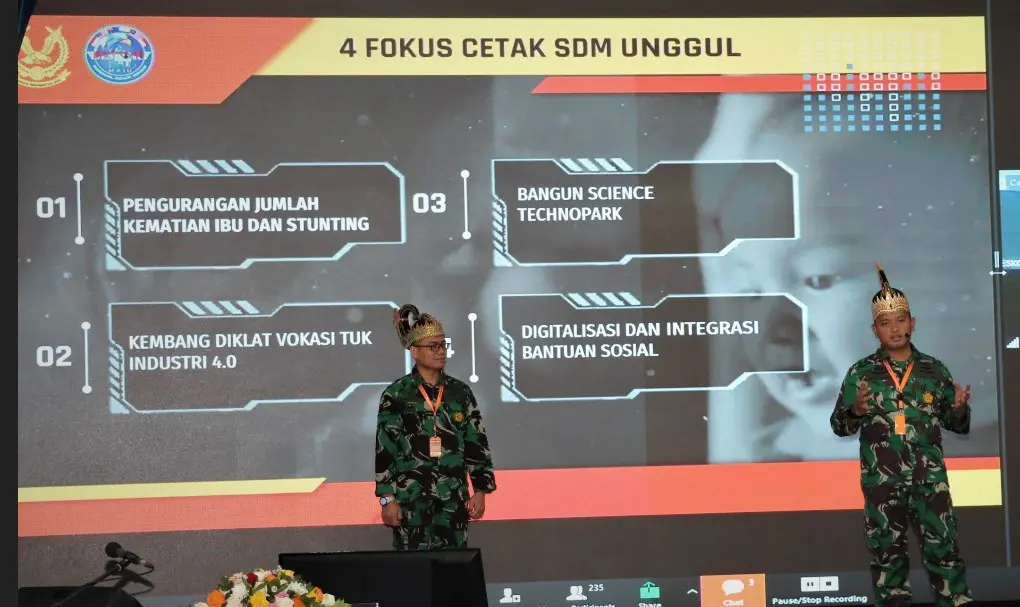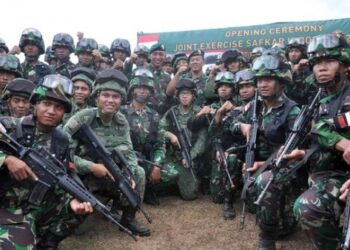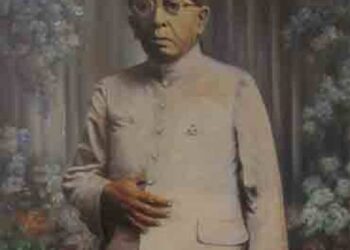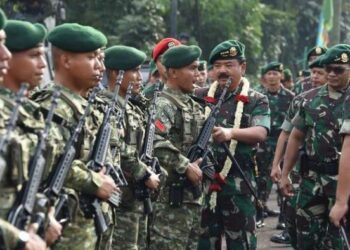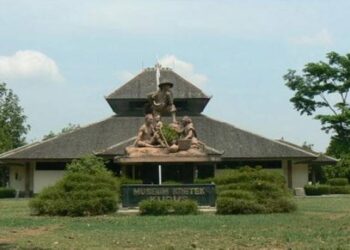Armed Forces of Republic Indonesia Role In National Development
From April 1, 1969, Indonesia officially began its national development. In the first TNI-AD seminar was more discussed about politics as well as president Sukarno’s belief that the TNI-AD was fully behind him. The 2nd seminar needs to reformulate the things listed in Tri Ubaya Cakti the results of the 1st seminar should be completely in accordance with the interests of the Indonesian people.
It is not surprising that the results of the 2nd seminar then have broad security, political and economic aspects. In the field of security is affirmed what the doctrine of defense of the people of the universe means, that is, it is not a doctrine of guerrilla warfare alone. Unless a state defense effort that includes the community.
Thus the TNI-AD wanted to give a sign to the TNI-AL and TNI-AU that the doctrine of the universe war is not just a war on the ground but there is an important role for the TNI-AL and TNI-AU to secure the country as a defense of the universe. In the 2nd TNI-AD seminar there was a demand for the TNI-AD for the improvement of all the people.
Although at that time being a member of the TNI-AD was very deficient in his life in the field of politics TNI-AD saw the importance of political development so that the commitment of the New Order to carry out Pancasila and the 1945 Constitution purely and consequently can be implemented.
So it cannot be denied by history that the national development that began on April 1 1969 was based on the 2nd TNI-AD seminar in 1966. Because at that time the main political holding was the TNI-AD led by General Suharto who held Supersemar.
Regarding the results in the field of economics in the 2nd TNI-AD seminar, it can be said that it can all be the foundation for economic development later. The results of the 2nd seminar in the field of Hankam named Tri Ubaya Cakti were then brought by TNI-AD officers to be proposed as part of the doctrine of security defense. That is what then produced the doctrine of ABRI Catur Dharma Eka Karma. The thinking gained from the seminar became the framework for the formulation of the doctrine of ABRI.
National development is done using the basic level of development trilogy, namely equalization development. ABRI does work supporting development in the area. With what it is named the operation work or Civic Mission, ABRI builds various facilities such as roads, irrigation bridges, and others.
There has been increased development of this work. In the 1980s there was criticism of ABRI’s role in national development. Abri is considered to be running a securities approach in carrying out security stability. Abri is considered to have always taken over from civilian employees. Abri should not harm employment opportunity providers. However, with all the shortcomings that ABRI does, the role that has been and is being given to national development is very positive. In fact, ABRI has never demanded a Hankam budget that exceeds 2% of GNP Indonesia.
Read also :
TNI Logistics Handling – ABRI Leadership Book
TNI Leadership In History And Struggle – Book Reviews
The Difference of Opinion on TNI – Summary of ABRI Leadership Book
The Role of TNI in National Development – Summary of ABRI Leadership Book
Strengths And Weaknesses in Development Outcomes
Progress in national development is highly visible in terms of economy, education, infrastructure, agriculture, industry, and others have increased rapidly. However, in the implementation of national development, there are also shortcomings or weaknesses. It also needs to be realized and identified for the improvement of the nation’s next journey.
The most glaring drawback after 25 years of national development is the widening gap between the rich and the not rich. Also, the progress gap reached in java island and Western Indonesia in general and the eastern part is influenced by a government that embraces centralist politics and does not provide decentralization to the region. people of Chinese descent are accelerating in terms of wealth. This brings about ethnic issues. Not only in Indonesia but ethnic Chinese in Southeast Asia. The government alleged that the government gave it a monopoly and a private oligopoly. Small entrepreneurs in Indonesia are not noticed so the distance becomes more visible between the rich and the less wealthy.
One that is also considered by most of the public as a weakness in development is the rising foreign debt. That in 1995 was close to the US$100 billion figure. Corruption also makes a weakness because at that time national development was an attitude that glorifies objects and money. Another often overlooked concern is the lack of development in politics, resulting in a lack of public participation in national development. That in the New Order government for 32 years was irreplaceable by the new leader. One of the obstacles for us is the weakness that is settled for our nation, so it is not caused by national development. The downside is that attitudes do not pay much attention to the need for similarities between words and deeds, between theory and practice, between concepts and implementations.
However, we must all be able to solve some of the problems that arise in national development. And on the way, we prevent new weaknesses from appearing. From the shortcomings that have arisen, we are biased to learn not to repeat and to give bias something more so that Indonesia becomes a more developed country.
Generation Leadership in Armed Forces of Republic Indonesia
There was a transition in ABRI leadership during the national development period in the first phase of the 1945 generation to the generation that entered the ABRI ranks after 1955. In the TNI-AL, TNI-AU, and Polri ali generation is not very kea rah kusus. But in the TNI-AD instead of generation is not only influenced by the general nature that differs between the 1945 generation and the next generation but the issue of the kusus that forms the leadership.
Due to the absence of the formation of TNI-AD officers through the military academy between 1950 and 1957 there was a poor situation in the officer pyramid. There were large numbers of 1945 officers in all levels of the officer rank, while the establishment after 1950 was only in the rank of first officer in a limited number, and the rank of middle officer was even less. In 1982 the next generation had only a few people who had reached high-ranking officers, even if the use of education in a normal way according to the rules prevailed. In 1982 it would have been difficult to replace officers if there was no specific action to educated potential officers.
In the TNI-AL and TNI-AU it is not too difficult to find generations because the number of officers themselves is not as much in the TNI-AD. So for a generation it’s not too much of a problem. In the TNI-AD must be created a special policy that allows the generations in his office quickly to move the generation running lancer. Therefore the 1945 generation formed a single military academy for the formation of the next generation of officers. In the hope that one source of wiraan ensures solid unity in the officer corps.
While this is not an easy or light thing, we are confident that the Indonesian nation will always produce sufficient ABRI leadership to carry out its obligations properly.
Read also :
TNI Logistics Handling – ABRI Leadership Book
TNI Leadership In History And Struggle – Book Reviews
The Difference of Opinion on TNI – Summary of ABRI Leadership Book
The Role of TNI in National Development – Summary of ABRI Leadership Book
BIBLIOGRAPHY
1. Sejarah Militer, ringkasan buku “Kepemimpinan Abri Dalam Sejarah Dan Perjuangan” halaman 246-297.






